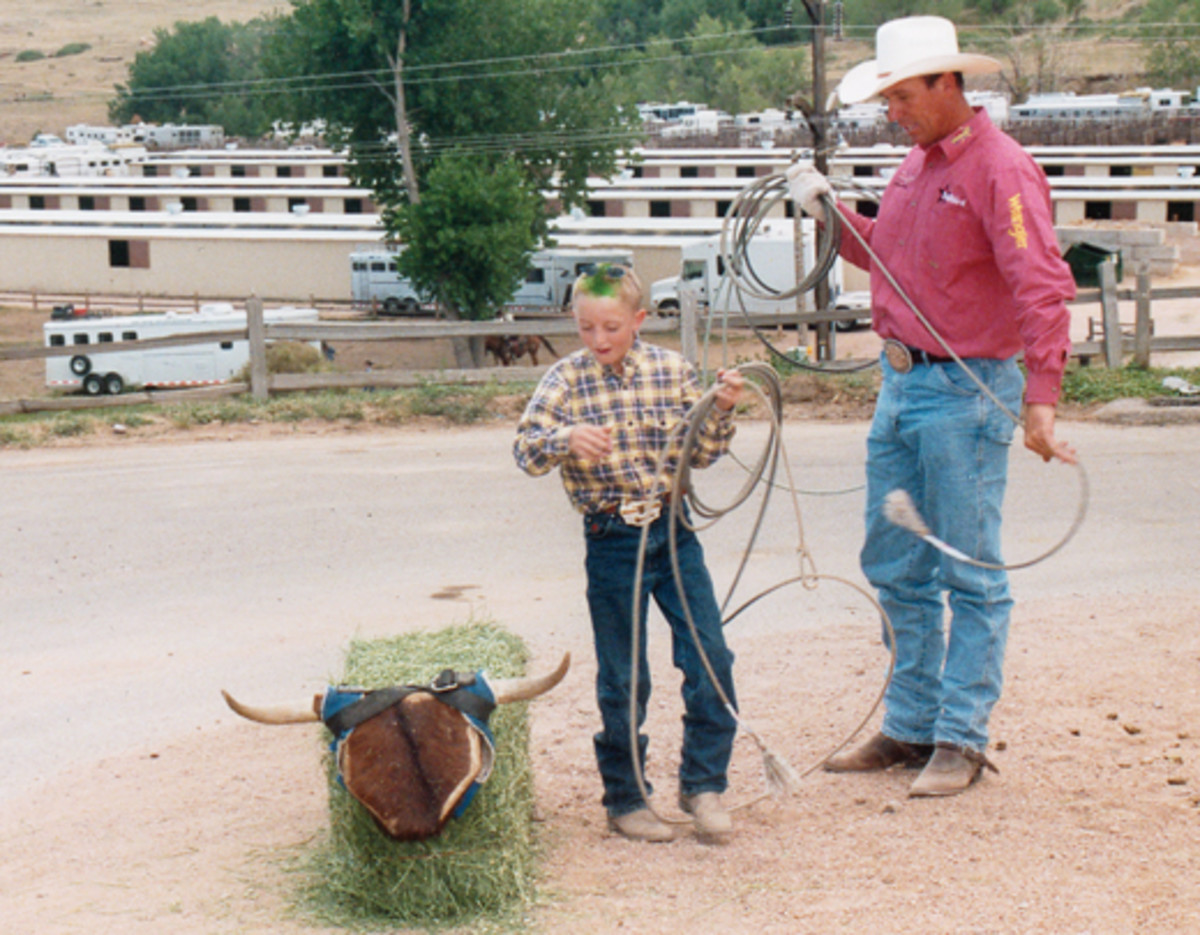I believe you can train a champion. It helps to get into the sport at a young age, whether you’re sparked and motivated by seeing it on TV or have a friend or relative who’s involved in roping. Something needs to motivate you to say, “Hey, I want to do that.”
Natural ability helps, but I believe anyone with the right opportunity and guidance can become a world-class roper. Everybody imagines himself in his heroes’ shoes. I know I’ve done it on the basketball court, pretending I sunk the winning shot at the buzzer
with the crowd going wild.

I think kids who grow up around it have the best shot of going all the way, because kids are naturally gifted and everything’s easier to pick up when you’re younger. But I believe I could train a beginner roper of any age to be very successful if he or she would follow my instructions.

The first thing you need to do is handle a rope-a lot. A rope has to be a part of you; a natural extension of you. You need to have a rope in your hand 24-7, to really get a feel for it. You need to be able to manage a rope, feed a rope, learn the different balance points. It can’t be a foreign object in your hand. You need to rope the dummy countless hours, from different angles. Tons of groundwork is a must, too, even if it’s at the dog’s expense.

Another critical element is horsemanship. You don’t want to be from the jerk-and-whip old school. You and your horse need to work as a team in order to be successful.

To go any distance in this sport, you need to learn some horsemanship fundamentals, because you might need to make a really good one if you don’t have a bunch of money lying around. Get instruction, whether it’s from this magazine, a book, clinic, video or whatever. Getting help is a wise investment. Seek advice from guys who constantly have good horses. It’s probably not a coincidence they keep working.

Don’t read one book or go to one school and think you know it all. There are always new techniques and more to learn. None of us is ever going to know it all. Then, when you hear or read something, go test it out for yourself. Be open-minded about trying new things, whether it’s on the dummy, live cattle, a burro or a goat.

You need to train just like any other athlete. Roping’s fun, so it’s easy to get in a routine of just going out there and doing it. But if you’re not practicing the correct procedures you’re making a lot of wasted runs.

It’s really important to have someone there to correct you like a coach, so you don’t practice bad habits and perfect those bad habits. If you’re taught the right way, you get good at it through repetition. But if you’re practicing the wrong technique you’re in big trouble. (Here, Wrangler National Finals Rodeo header Shain Sproul heels one for Lane Karney at a recent roping school.)

You learn to rope in stages. Be careful of competing before you’ve got a consistent grasp of the fundamentals. There’s no sense doing things you’re not ready to do, and it can be dangerous if you try to add speed before you’re ready. It’s important to learn in a controlled environment, so kids don’t get scared or hurt in the early going. (This shot was taken at the John W. Jones branding in Morro Bay, Calif.)

All you parents out there need to honestly evaluate your ability to coach your kids. If you aren’t their coach, you need to be careful who you get to help them. If you get them started on the wrong foot, it’s going to be twice as hard later on. (Here, NFR heeler Dugan Kelly gives Taylor Karney a few pointers on the Heel-O-Matic.)

The fundamentals are critical, because you can always fall back on them. If you instill those fundamentals in your mind at the start, they will eventually become second-nature and when you’re under the gun you’ll be able to execute. Brandings are a great place to build on those fundamentals, especially if you’re surrounded by patient, knowledgeable people who won’t let you get in a storm.

To succeed takes a lot of sacrifice and strong will. You need to realize that if you only go at it half-hearted, you can only expect a half-hearted result. What I’m talking about here all starts with roping being each kid’s choice in the first place. You can’t force the will of somebody, and if it’s not in someone’s heart they aren’t going to make it in the long run anyway.

You need to practice in conditions similar to what you’ll be facing in competition, so you aren’t distracted on competition day. Turn on the music sometimes, string up the barrier, practice scoring-every detail counts. You can’t be overprepared










